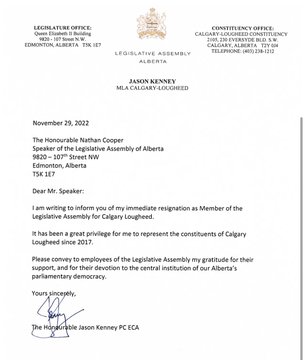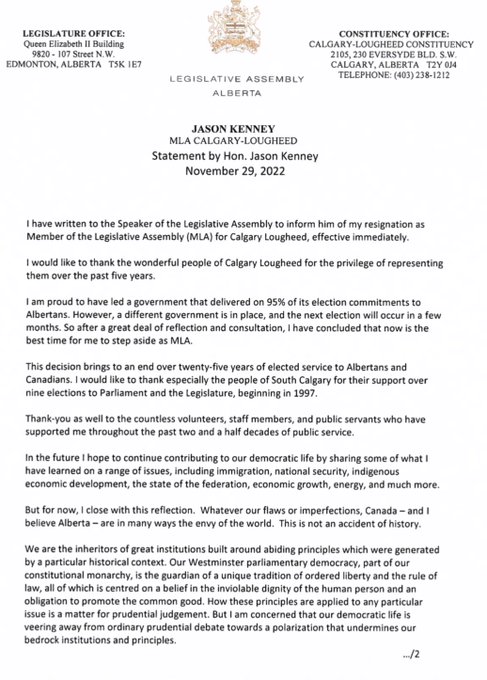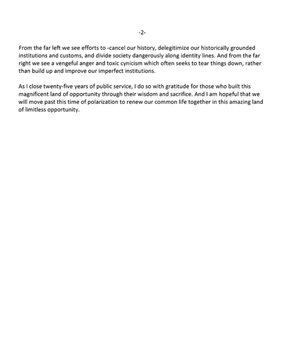Alberta sovereignty act would give cabinet unilateral powers to change laws
Proposed legislation was key to Danielle Smith’s victory in UCP leadership race
The measure is described in Bill 1, the Alberta Sovereignty within a United Canada Act, introduced Tuesday in the provincial legislature.
The bill describes how the Alberta government plans to not enforce federal legislation, policies or programs it decides are "harmful" to Alberta's interests or infringe on the division of powers in the Constitution.
Smith said the bill was created to get Ottawa's attention after her two predecessors failed to get traction.
"I hope we never have to use this bill," Smith told reporters following the bill's introduction. "I hope that we've sent a message to Ottawa that we will vigorously defend our constitutional areas of jurisdiction and they should just butt out."
Smith introduced the idea for the bill last summer during the race to replace Jason Kenney as leader of the governing United Conservative Party.
Although the bill was criticized by most of her opponents in the leadership race, many UCP members embraced the idea of taking tangible action to push back against the federal government.
Smith became leader after winning on the sixth ballot Oct. 6. All but one of her opponents in the now race sit in her cabinet.
Scope of powers
On Sept. 6, the Smith campaign released an overview of how the act would work. However, it did not mention the wider scope of powers granted to cabinet.
Under existing rules, cabinet has the power to make and change regulations through orders in council. Giving the power to unilaterally change legislation is normally allowed during emergency situations.
In April 2020, the Kenney government gave itself that power under Bill 10, the Public Health Emergency Powers Amendment Act, to keep public services operating in the early months of the COVID-19 pandemic.
The government ended up repealing that law a year later after facing widespread public criticism and a constitutional challenge for giving itself too much power.
During a news conference following the bill's introduction, both Smith and Justice Minister Tyler Shandro denied that it would allow cabinet to change laws behind closed doors.
Shandro said that the measure was democratic because the legislative assembly would vote on a resolution before it went to cabinet.
"This is the important difference," Shandro said. "It begins with an open and democratic debate in the assembly."
NDP deputy leader Sarah Hoffman wasn't buying it. She said Smith was granting herself "dictatorial" powers through the bill.
"She wants to give herself the power to go behind closed doors and rewrite laws," Hoffman said.
"It's not democratic and has no place in democracy."
Smith sworn in as MLA Tuesday
Smith introduced the sovereignty legislation Tuesday afternoon shortly after she was sworn in as the MLA for Brooks-Medicine Hat. The four-week fall legislature sitting started with a throne speech and is expected to wrap up just before Christmas.
Smith has directed her cabinet ministers to look for federal "intrusions" into provincial jurisdiction, past and future, and create special resolutions that will be introduced and debated in the spring 2023 legislative session.
MLAs would be given a free vote on the motions, which will describe the alleged infraction and how it hurts Alberta. Once passed, the resolutions become non-binding recommendations to cabinet.
The legislation would allow cabinet to direct provincial entities, including municipalities, municipal police forces, post-secondary institutions, school districts and regional health authorities not to enforce federal laws. Cabinet could also direct a minister to issue an order or directive.
The bill is silent on what happens if any organization refuses to follow cabinet's directives and continues to follow federal law.
Any measures made by cabinet must be in line with the Constitution, nor can they undermine Indigenous rights. The government says it will respect court rulings that find its actions are unconstitutional.
Powers used by cabinet would end two years after a resolution is passed. Cabinet could decide to extend them for an additional two years.
The bill also limits the time frame an organization can ask for a judicial review to 30 days, instead of the usual six months.
The court must judge the government's actions using the standard of "patent unreasonableness" instead of the less stringent and more common thresholds of unreasonableness or correctness.
The bill also aims to protect the government and provincial entities from civil proceedings launched due to consequences that arise from the act.
He is a joke
Former premier Jason Kenney resigns his seat in Alberta's legislature
Kenney, the former leader of the UCP, was premier until last month
"A different government is in place, and the next election will occur in a few months," Kenney wrote in a statement posted to Twitter.
"So after a great deal of reflection and consultation, I have concluded that now is the best time for me to step aside as MLA."
Kenney said that he was proud to have led a government that delivered on the majority of its election commitments, but said that now is the right time for him to step away from public office after 25 years in elected politics, including as a federal MP.
He also wrote to the speaker of the legislature to inform him of his decision.
In his public statement, Kenney said he believes Canada and Alberta are, in many ways, the envy of the world. But he also expressed his wariness about the current state of politics.
"I am concerned that our democratic life is veering away from ordinary prudential debate towards a polarization that undermines our bedrock institutions and principles," he wrote.
"From the far left we see efforts to cancel our history, delegitimize our historically grounded institutions and customs, and divide society dangerously along identity lines.
"And from the far right we see a vengeful anger and toxic cynicism which often seeks to tear things down, rather than build up and improve our imperfect institutions."
Kenney, 54, was the premier of Alberta and the leader of the UCP from 2019 to 2022. In May, he announced his resignation from the premiership after winning a leadership review narrowly by 51.4 per cent.
In October, UCP voters tapped Danielle Smith to succeed him.
Prior to leading the UCP, Kenney was the last leader of the Alberta Progressive Conservative Party that merged with the Wildrose Party to form the UCP.
Before becoming a figure in Alberta's provincial politics, Kenney had served as an MP and was a cabinet minister when Stephen Harper was prime minister.
He was first elected to the House of Commons in 1997 for the Reform Party.
Timing of resignation
Kenney's decision to resign came on the day that Premier Danielle Smith's government tabled the Alberta Sovereignty within a United Canada Act.
One political watcher said Kenney's announcement appears to highlight his disapproval of the current premier's decisions and of the direction that politics are headed in.
"He could've delivered this resignation at any time, the fact that he did it immediately after the unveiling of the sovereignty act, I don't think is coincidental," said Mount Royal University political scientist Lori Williams.
"He didn't want to be associated with looking as though he wanted to be endorsing any of this … clearly, he has not supported Danielle Smith."
With files from Jonathon Sharp





No comments:
Post a Comment